On 26 June and 31 July 2023, Kigali Rwanda. GGGI in partnership MINICT, RURA, R-COOL, GIZ and EnviroServe carried out a training workshop to District Officials working in Environment and Health and Sanitation officers from sector level with an aim to improve E-waste collection and proper treatment in the City of Kigali and Secondary Cities. A key training conducted as capacity building under The Ministry of Environment of the Government of Rwanda initiated a Memorandum of Understanding (MoU) with the Ministry of the Environment, Climate and Sustainable Development of the Government of the Grand Duchy of Luxembourg to strengthen cooperation and technology transfer between the two countries titled project Waste to Resources: Improving Municipal Solid Waste (MSW) and Hazardous Waste Management in Rwanda.
The one day training workshop on E-waste management for District Environment Management Officers and Sector Health and Sanitation Officers from Kigali City (Nyarugenge, Gasabo and Kicukiro Districts), Huye and Muhanga Districts. In total 62 participants attended including 17 Females and 22 males. The second group that received training in July had 62 participants comprised of District Environment management Officers & Sector Health & Sanitation Officers from Nyagatare, Rubavu , Rusizi and Musanze secondary cities.
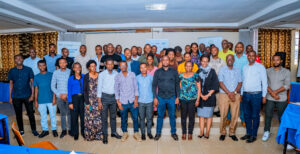
Group 1 participants that received training in June 2023
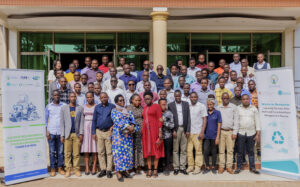
Group 2 that received training in July 2023
The Government of Rwanda through the Ministry of Environment initiated a Memorandum of Understanding (MoU) with the Ministry of The Environment, Climate and Sustainable Development of the Government of the Grand Dutch of Luxembourg to strengthen the cooperation and technology transfer on sustainable waste management between the two countries. With this MoU, the Grand Dutch of Luxembourg financed Waste to Resource Project. The project aims to reduce emissions of Greenhouse gases through sustainable waste management. The project is led by the Ministry of Environment and implemented by GGGI Rwanda.
The Waste to Resource project Outcome B is aiming at improving collection rate and management of e-waste in Kigali and Secondary Cities”. The Global Green Growth Institute (GGGI) in partnership with MINICT, RURA, R-Cool and EnviroServe, organized an awareness campaign on e-waste management, under this theme: “Proper E-waste Disposal for a Healthier Future”. This awareness campaign commenced in March 2023 and is still ongoing in Kigali City and secondary cities. Around 642kgs of e-waste was collected during the mass community awareness campaign done during Umuganda of 25 March 2023. A series of activities were prepared for the awareness on e-waste management including Developing awareness materials such as posters and messages to disseminate to the community, organize TV and radio talk shows, organize Umuganda for e-waste collection and carry out training on e-waste management in Kigali city and secondary cities.
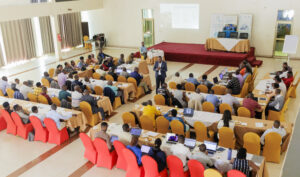
Surveys conducted in Rwanda revealed that from 2010 to 20214, import of ICT equipment increased by 5 times and Rwanda has potential annual e-waste generation of 9,417 tons of which 7,677 tons (81.52%) are contributed by individuals, 1,143 tons (12.14%) by public institutions and 597 tons (6.34%) by private institutions. This is mostly due to the growing dependency on the use of ICT in all sectors of the economy including mobile communication, education, health, finance, and service delivery. Therefore, proper handling of e-waste is an emerging challenge as some e-waste contains toxic and hazardous substances such as lead, mercury, arsenic, cadmium, and selenium among the others which poses severe threats and risks to human health and to the environment if not properly handled and disposed of. This requires specialized disposal methods, skills, and special treatment facilities.
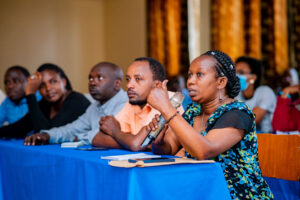
On behalf of Ministry of ICT& Innovation Alice Higiro mentioned that the Government of Rwanda is putting efforts to collect e-waste, currently Rwanda is producing around 10.000 tons of e-waste per year, and no one knows where that e-waste is kept. She added that we still need to improve our ways of managing waste, sorting waste is still at low level, a study conducted by MININCT showed only 40% are willing to sort waste but they need tools to do it. MINICT was happy that training District and Sectors Officers is being done and would be a good channel to reach out community, the government will support in raising awareness to the local community as well.. She thanked GGGI for commitment to raise awareness on e- waste management, through this training, different ideas, and strategies to collect and handle the e-waste will be discussed.
The training included key topics on the findings on the E-Waste assessment in city of Kigali and the secondary cities ,lead by Mr Kabera Telesphore, GGGI Consultant. Furthermore the CEO of EnviroServe Olivier Mbera gave a detailed introduction to Proper E-waste management for a greener and healthier Rwanda. Mr Emmanuel Nkurunziza, The Legal Officer from RURA gave bit of context on the regulations on E-waste management in Rwanda, followed by Jean Pierre DUKUZIMANA, Government Movable Assets Management Officer from Rwanda Housing Authority (RHA) explaining the Disposal of Electronic and electric assets and their accessories.
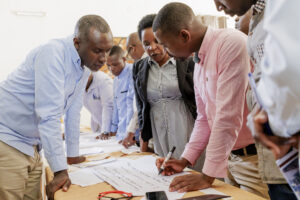
Groupwork exercise
Olivier Mbera, the CEO of EnviroServe, spoke on the dangers of handling e-waste in the informal way. Adding that E-waste contains heavy metals that are harmful to the public health and to the environment. Some of heavy metals containing electronic and electric equipment are cadmium, lead, copper, mercury, chromium and some of those heavy metals are inhaled when dismantling e-waste improperly and may be the source of health issues such as respiratory diseases, negative impacts on brain development, cadmium impairs liver, kidneys, spleen and intestines, cancer. He also gave an example of some contaminated food and vegetables grown in gardens by people living near landfills and people consuming them without thinking of heavy metals that are inside their foods.
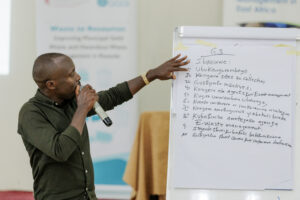
The participants were given the opportunity to join groups and discuss this new knowledge received in the training could be utilized in their respective roles in order for them to also share awareness about e-waste management and how this information can be distributed amongst the public and private sector for all citizens to be able to understand and adhere to the harmful effects to the environment and their health for citizens to be involved. Several recommendations were given by the participants that included:
- District and sector officers said they are committed to create awareness on e-waste management through Inteko z’abaturage, Umuganda, Igitondo cy’isuku and other meetings dedicated to local community,
- They requested EnviroServe to bring e-waste collection at sector level,
- They advised EnviroServe to incentivize e -waste collection, to motivate people to drop off e-waste
- They requested the government to be more proactive in their awareness campaigns and communicate on all channels to motivate citizens to engage.
- The District staff agreed they will establish Assets Valuation Committee, identify e-waste at their offices and inform EnviroServe to come for collection on a quarterly basis.